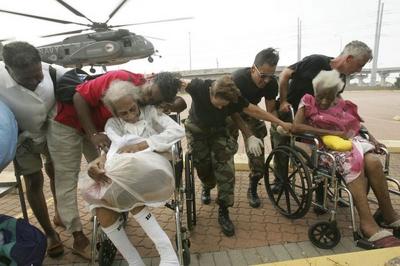I had hoped not to blog about the Terri Schiavo case, but was driven to it by today's report that
she was subpoenaed by House Republicans today in a last-ditch effort to prevent the removal of her feeding tube. Apparently, interfering with a person subpoenaed by Congress is a federal offense, and the
Party of Big and Intrusive Government had no hesitation about using its naked power to interfere in a family dispute which has already been heard at every level of the courts.
If you haven't been following closely, the best summary I have found is
here, with links to relevant court documents. I'm not going to review the whole case - I want to concentrate on the
17 medical affidavits recently introduced by Schiavo's parents, "based on the fact that new evaluation and therapeutic technologies can significantly impact brain damaged and disabled persons." The affidavits can be found
on Schiavo's parents' website. I learned about them from
Ampersand, who also linked to
Majikthise's perceptive commentary.
Ampersand prefaces his analysis (with which I fully agree) with the disclaimer, "I’m not a doctor, of course." Neither is Majikthise (with whom I also fully agree), but I am. I have a doctorate in clinical psychology. I have completed a year-long practicum in clinical neuropsychology. I'm not qualified to evaluate Terri Schiavo myself - that would take a board-certified neurologist or neuropsychologist - but I am certainly qualified to evaluate the adequacy or inadequacy of someone else's evaluation. And so I have read every one of the 17 affidavits, plus the report of the examining physician on whose findings Schiavo's parents are basing their case, plus the rulings from the trial court and the court of appeals.
None of the 17 affidavits are by providers who examined Schiavo. Only one of the 17 providers claims to have reviewed her medical records. The remaining 16 providers apparently based their statements primarily on six snippets of videotape, totalling 4 minutes and 20 seconds, which have been posted on Schiavo's parents' website and broadcast repeatedly on the news. Several of them explicitly say that they viewed these clips on the net, and the others all refer to the same short samples of behavior (e.g., Schiavo's eyes tracking a balloon). Many of them say they read news stories about Schiavo. One admits to only seeing news stories and photographs. They all reference their experience with "similar patients," but without qualifying what they mean by "similar." For example, one doctor draws comparisons to catatonic patients - but catatonia simply refers to an absence of voluntary motion or interaction, and can be caused by any number of things. Another references stroke patients, and two more talk about patients with Alzheimer's. As Ampersand points out, not one of them mentions the specific degree and type of brain damage that Schiavo has, as documented by her CAT scans:
Theresa's brain has deteriorated because of the lack of oxygen it suffered at the time of the heart attack. By mid 1996, the CAT scans of her brain showed a severely abnormal structure. At this point, much of her cerebral cortex is simply gone and has been replaced by cerebral spinal fluid. Medicine cannot cure this condition. [...]
Although the physicians are not in complete agreement concerning the extent of Mrs. Schiavo's brain damage, they all agree that the brain scans show extensive permanent damage to her brain. The only debate between the doctors is whether she has a small amount of isolated living tissue in her cerebral cortex or whether she has no living tissue in her cerebral cortex.
Most of the affidavits mention sophisticated new neuroimaging techniques which have been developed since the 1996 exams, and recommend that Schiavo receive a functional MRI (which tracks blood flow in the brain in response to specific stimuli) or a neuroSPECT exam (another functional imaging test). They note, correctly, that functional tests are capable of providing much more information about the nature and extent of brain damage than structural tests like a CAT scan. Yet Terri Schiavo's cerebral cortex is not
damaged, it is
absent. The affidavits repeatedly fail to engage with this finding. Thus, we have Dr. Ankerman: "The long duration lack of speech seen after injury trauma is not always due to destruction of brain structure. Sometimes it is due to a state of brain dysfunction that is reversible." Dr. Uszler: "Standard MRI or CAT scans are anatomy scans; they tell you if the tissue is there and its current structure, but these tests do not tell you whether the brain is working." And, most incredibly, Dr. Terman: "If the results of her response to certain neurological tests, for example the fMRI, were similar to that of normal individuals with undamaged brains, such data might indicate that there is some potential for her rehabilitation."
I suppose that these statements are technically true. Speechlessness is
not always due to destruction of brain structure, but if massive destruction of brain structure is present, that's certainly the way to bet. CAT scans tell you if tissue is present and structured normally, but not if it's working; however, if tissue is
absent, you'd think its lack of functionality could be assumed. And yes,
if Terri had the same fMRI results as a healthy person, that would bode well for rehabilitation - but as we sometimes say here at Respectful of Otters, it's equally true that if my aunt had testicles, she'd be my uncle. Terri Schiavo doesn't have a cerebral cortex. She's not going to have a normal fMRI pattern. She simply
couldn't. So it's pointless to speculate about what it would mean if she did.
What about the "new treatments" which might help Schiavo? Many of the providers assert that she could be trained to swallow, and they're probably correct. Swallowing is a brainstem reflex, and Schiavo still has her brainstem. The muscles of her throat could be stimulated - Mr. Lakas suggests using electric shock - to produce an automatic swallowing response to liquid nutrition. It's hard to see how that would amount to an increase in quality of life, however, given the mechanical nature of the reflex and the likely increased risk of choking or aspiration pneumonia. What else? One of the doctors (Ankerman, again) recommends the off-label use of an Alzheimer's drug, based on unpublished anecdotal evidence that it helps catatonic patients (not patients in a persistent vegetative state). Another recommends hyperbaric therapy, about which the trial court judge had previously pointed out, "It is interesting to note the absence of any [published] case studies since this therapy is not new and this condition has long been in the medical arena."
Two others make unsubstantiated claims that Schiavo could somehow be taught to communicate: "By helping Ms. Schiavo to communicate she will be able to tell us things, such as whether or not she wants to die, and if she wants a divorce" (Ms. Hyink), "sometimes even if a patient can only answer "Yes" or "No" it is still possible to determine what that patient wants in terms of end-of-life medical care" (Dr. Terman). Indeed, if Schiavo were capable of speech or meaningful communication it would be much easier to determine her wishes. That hypothetical, however, is completely irrelevant to the case.
The 17 affidavits all put considerable weight on the fact that, in the video snippets on Schiavo's parents' website, she appears to be responding to stimulation. Her eyes track a balloon. She smiles in response to her mother's voice. The affidavits therefore conclude that Schiavo is appropriately responsive to external stimuli, and that she is at least minimally conscious - not in a persistent vegetative state (PVS) at all. Yet none of the exhibited behaviors are, in themselves, unusual for patients with PVS. According to the National Institute of Neurological Disorders and Stroke:
Individuals in such a state have lost their thinking abilities and awareness of their surroundings, but retain non-cognitive function and normal sleep patterns. Even though those in a persistent vegetative state lose their higher brain functions, other key functions such as breathing and circulation remain relatively intact. Spontaneous movements may occur, and the eyes may open in response to external stimuli. They may even occasionally grimace, cry, or laugh. Although individuals in a persistent vegetative state may appear somewhat normal, they do not speak and they are unable to respond to commands.
So the presence of smiles, grimaces, vocalizations, and eye movements alone is not relevant to the question of whether Schiavo has retained any degree of consciousness or may benefit from therapy. They may be in part reflexive - as when she "smiles" when her cheek is stroked - and they may be completely random. The key to the 4 minutes and 20 seconds of video is that Schiavo seems to be
responding in a meaningful way to specific stimuli. All 17 experts who reference the videos take for granted that they demonstrate meaningful emotional or communicative responses. Could they really all be wrong?
Oh, yes. All you need to know to illuminate the question is that the six snippets of video were selected from 4 1/2
hours of tape. As do most people with PVS, Schiavo emits random behaviors and noises. If a person gives enough commands or makes enough interaction attempts over the course of several hours, by sheer coincidence some of Schiavo's random behaviors will appear to coincide with their commands. Both the trial court and the appeals court viewed the entire 4 1/2 hour tape, and both concluded that her responses were indeed random. As the original court decision
pointed out:
Dr. Hammesfahr testified that he felt that he was able to get Terry Schiavo to reproduce repeatedly to his commands. However, by the court's count, he gave 105 commands to Terry Schiavo and, at his direction, Mrs. Schindler gave an additional 6 commands. Again, by the court's count, he asked her 61 questions and Mrs. Schindler, at his direction, asked her an additional 11 questions. The court saw few actions that could be considered responsive to either those commands or those questions. The videographer focused on her hands when Dr. Hammesfahr was asking her to squeeze. While Dr. Hammesfahr testified that she squeezed his finger on command, the video would not appear to support that and his reaction on the video likewise would not appear to support that testimony.
Hammesfahr's own report makes clear that he relied on a ludicrously low standard to conclude that Schiavo's responses were purposeful:
Interestingly, some of the commands, such as close your eyes, open your eyes, etc. she tended to do several minutes after I gave her the command to do so. She had a delay in her processing of the action. However, when praised for the action, she would then continue to do the action repetitively for up to approximately 5 minutes. As we had moved on to other areas of the exam, at times she was continuing to do the previous command, then at inappropriate times since the focus of the exam had changed.
He commanded her to emit some of her known behaviors, such as closing or opening her eyes. If she did, that was a "hit" - a sign that she had obeyed the command. If she did so several minutes later, that was still a "hit," apparently no matter what else he'd asked her to do in the interim. If she
continued , long after he'd moved on, that was not a sign that she was unresponsive to his subsequent commands but, instead, a sign that she was responsive to praise. Almost any response, correct or incorrect, could apparently be interpreted to signal consciousness. Hammesfahr, like Schiavo's parents, wanted to be convinced.
Terri Schiavo's case is tragic, but not medically complicated. Nothing about it suggests any room for diversity of medical or neuropsychological opinion. The "experts" who submitted affidavits appear to know little about her case beyond what they were able to glean from cherry-picked videotape segments only a few minutes in length. They recommend sophisticated neuroimaging techniques which are not relevant to the question of the feasibility of rehabilitation when the cerebral cortex is gone. Frankly, I can't imagine what led any of them to believe they had sufficient information to submit an affidavit. But some of their statements offer disturbing clues.
Dr. Eytan would seemingly reject any pre-injury statement about the conditions in which a person would prefer to refuse medical treatment, "because we are all in the process of changing." In the greatest unintentional irony of the entire stack of affidavits, she remarks that "Ms. Schiavo is not the same person as she was when she made her alleged remarks about not wanting to live in a certain condition." By this logic, she would apparently argue to invalidate any Living Will or advance directive. Dr. Senno states that just because Schiavo hasn't had any higher neurological functions for the past fifteen years, that doesn't mean she won't suddenly develop them today or tomorrow. By that standard, again, no one could ever be removed from life support. These doctors reject the fundamental right to refuse unwanted medical intervention. Imagine being kept alive forever in a mindless, volitionless, decerebrate, unresponsive condition, regardless of anything you might previously have said about your wishes to avoid such a state - just in
case some new treatment were developed in the future which might cure you. That appears to be the new standard these medical providers are advocating.
(Tomorrow I'm planning to post about the ethical aspects of the case.)Update: Ampersand posts an image from Terri Schiavo's CAT scan, next to an image of a healthy brain. The amount of brain tissue missing is truly shocking.













